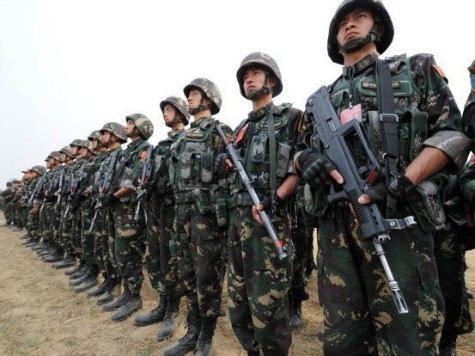
The Obama Administration and Pentagon officials continue to shrug off concerns over a new report by the Defense Science Board that revealed Chinese hackers have accessed over two dozen major U.S. weapons systems.
“They [China] aren’t building an F-35 in Beijing from what they got,” a senior U.S. official told NBC News flippantly.
Pentagon press secretary George Little downplayed the security breach as well.
“Suggestions that cyber intrusions have somehow led to the erosion of our capabilities or technological edge are incorrect,” said Little.
Despite the Obama Administration’s best efforts to mute the report’s findings, military experts like retired admiral and former commander in chief of the U.S. Pacific Fleet James A. Lyons, Jr. and Asian affairs author Gordon G. Chang say the Administration’s China policy is alarmingly misguided.
“There is something very wrong at the core of the Obama administration’s and the Pentagon’s China policies,” wrote Chang and Lyons in the Los Angeles Times.
For example, Chang and Lyons say that the Obama Administration’s unprecedented decision to invite China’s navy to participate in the 2014 Rim of the Pacific (RIMPAC) naval exercise held off Hawaii is a major unforced error.
“While the Chinese plan to dominate their waters and eventually ours, we are helping them increase their effectiveness with invitations to RIMPAC and other exercises,” wrote Chang and Lyons. “As Beijing’s behavior has become more troubling, the Pentagon has clung to the hope that military-to-military relations will somehow relieve tensions with the Chinese.”
Others warn that China’s participation in the RIMPAC exercises could, itself, represent an opportunity for further Chinese espionage.
The Pentagon, however, says its invitation for China to participate in RIMPAC represents no such threat.
“The U.S. Navy has operational security safeguards to protect U.S. technology and tactics, techniques and procedures from disclosure,” said Pentagon spokeswoman Lieutenant Colonel Catherine Wilkinson.
Wilkinson’s assurances were delivered before the Defense Science Board’s recent report detailing Chinese hacking of information on U.S. weapons.
Among the many weapons systems compromised were: details of the Patriot missile system; the Terminal High Altitude Area Defense (THAAD); the Navy’s Aegis ballistic-missile defense system; the F/A-18 fighter jet, the V-2 Osprey; the Black Hawk helicopter; the Navy’s new Littoral Combat Ship; and the most expensive weapons system ever devised, the F-35 Joint Strike Fighter, whose projected cost is $1.4 trillion.
Obama press secretary Jay Carney says the Administration has “been clear in our concern about cyber-security, and our concern about the fact that there have been cyber-intrusions emanating from China.”
The Obama Administration’s “concern” over Chinese cyber-espionage, however, was not front and center in Tuesday talks between White House National Security Adviser Tom Donilon and Chinese military officials at the Chinese Defense Ministry.
Indeed, according to Reuters, the topic of Chinese cyber attacks never came up.

COMMENTS
Please let us know if you're having issues with commenting.